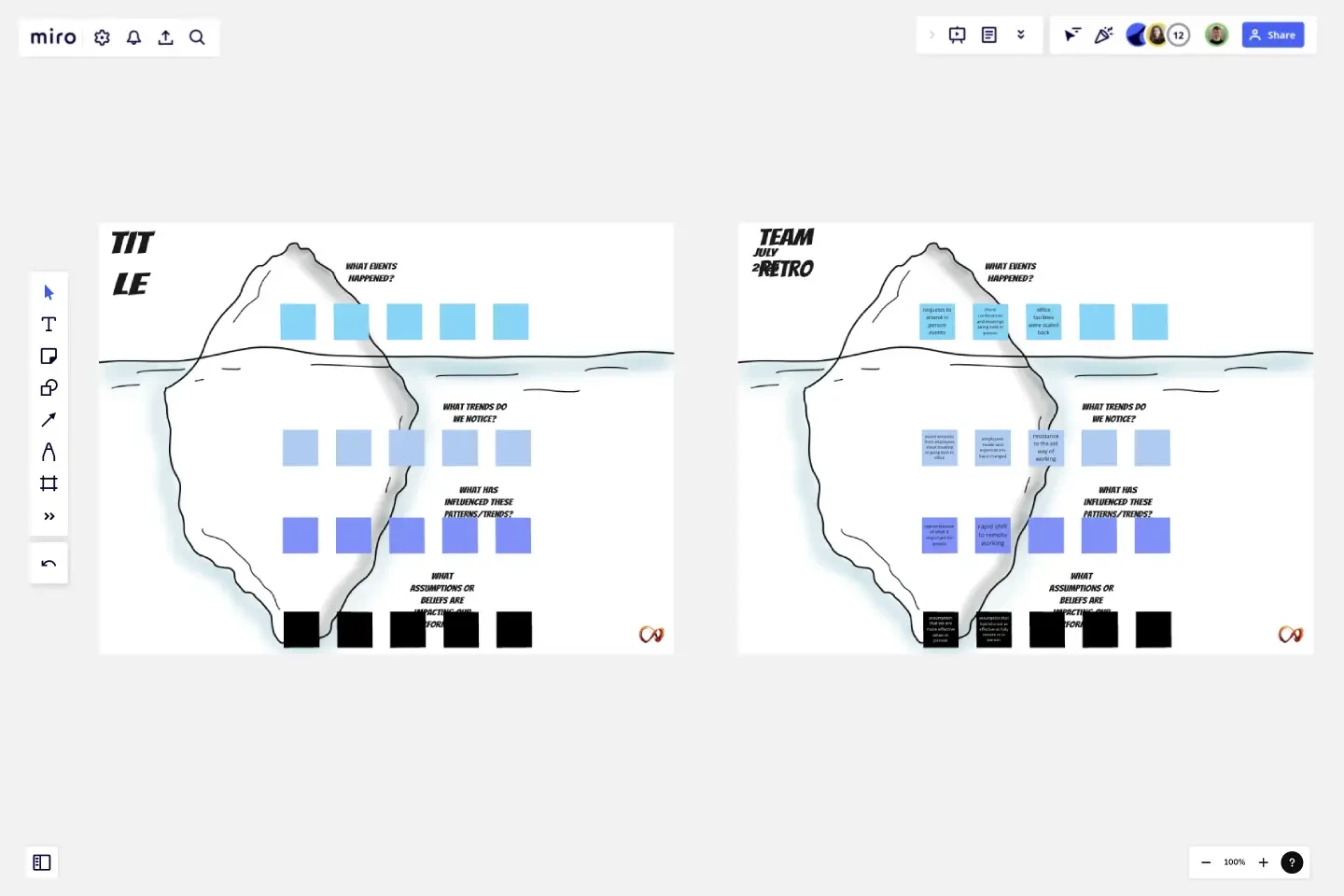Iceberg Reflection
This handdrawn canvas using the metaphor of an iceberg is digging deeper and getting below what is on the surface of what is happening. After all 85% of the icebergs lies below the surface of the water.
This canvas is an engaging and fun way to get a team reflecting on their performance and looking for root causes. It helps ensure that everyone gets heard and alignment is created.
When to Use the Canvas?
As a leader or facilitator there are key moments in a team's journey when a deeper reflection and regrouping are required. Use this canvas at these touch points. This may be scheduled periodically to support moving from forming, storming, norming and performing (Bruce Tuckman's team development model) or when you notice team behaviors require an intervention.
This canvas is particularly helpful when you realize that limiting mindsets and assumptions are getting in the way of the team's progress.
Why Use It?
Because handdrawn elements bring a whimsical and fun energy into work, and who couldn't use more of that on a day to day basis?! Plus no one ever complained of too much alignment or shared understanding in a team.
How to Use It?
The prompt questions in this template support reflection and reconnection. The prompt questions in this canvas are borrowed from Systems Thinking.
(Original source of the iceberg model is believed to be Anthropologist Edward T. Hall)
These prompt questions are suggestions, feel free to change these prompts to support the conversation you want to have with your team.
Start by focusing on the events that happened, then move to the trends, what is influencing these trends and down to the underlying assumptions impacting performance.
This template could also be used during change programs and/or in team or personal coaching conversations. Other versions of the iceberg model have been used to explore organizational culture.
Have fun and let the lighthearted spirit of the canvas ignite inspiration and creativity!
This template was created by Island Inspirations.
Get started with this template right now.
OKR Drafting Board
Works best for:
Agile
The OKR Drafting Board (New) is a visual tool for defining and tracking Objectives and Key Results (OKRs). It provides a structured framework for setting ambitious goals, defining measurable outcomes, and aligning teams around shared objectives. This template enables organizations to articulate their strategic priorities, track progress transparently, and foster accountability and alignment across teams. By promoting focus, alignment, and agility, the OKR Drafting Board empowers organizations to achieve breakthrough results and drive continuous improvement.
Startup Canvas Template
Works best for:
Leadership, Documentation, Strategic Planning
A Startup Canvas helps founders express and map out a new business idea in a less formal format than a traditional business plan. Startup Canvases are a useful visual map for founders who want to judge their new business idea’s strengths and weaknesses. This Canvas can be used as a framework to quickly articulate your business idea’s value proposition, problem, solution, market, team, marketing channels, customer segment, external risks, and Key Performance Indicators. By articulating factors like success, viability, vision, and value to the customer, founders can make a concise case for why a new product or service should exist and get funded.
Lean Project Charter
Works best for:
Agile
The Lean Project Charter template provides a streamlined approach to defining project objectives, scope, and success criteria. It emphasizes clarity, brevity, and alignment with Lean principles, enabling teams to kickstart projects with focus and purpose. This template empowers teams to set clear goals, establish shared understanding, and align stakeholders, driving efficiency and effectiveness in project delivery. By promoting transparency and accountability, the Lean Project Charter sets the foundation for successful project execution and continuous improvement.
FMEA Analysis Template
Works best for:
Agile Methodology, Strategic Planning, Software Development
When you’re building a business or running a team, risk comes with the territory. You can’t eliminate it. But you CAN identify it and mitigate it, to up your odds of success. Failure Modes and Effects Analysis (FMEA) is a powerful tool designed to help you manage risk and potential problems by spotting them within a process, product, or system. And you’ll spot them earlier in your process—to let you sidestep costly changes that arise late in the game or, worse, after they’ve impacted your customers and their experience.
Penny Game
Works best for:
Agile
The Penny Game is a simulation exercise that illustrates the impact of batch size and work in progress on cycle time and throughput. By tracking the flow of pennies through a production system, teams learn how to identify bottlenecks, optimize processes, and improve efficiency. This template offers a practical way to explore Lean principles and drive continuous improvement, empowering teams to streamline their workflow and deliver value more predictably.
Scrum Puzzle
Works best for:
Agile
The Scrum Puzzle is a collaborative activity that reinforces Scrum roles, artifacts, and ceremonies. By assembling a puzzle representing the Scrum framework, teams gain a deeper understanding of its components and how they interrelate. This template offers a fun and interactive way to reinforce Scrum knowledge and promote team alignment, empowering practitioners to apply Scrum principles effectively and deliver value with agility.
